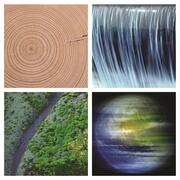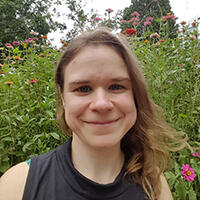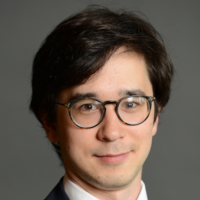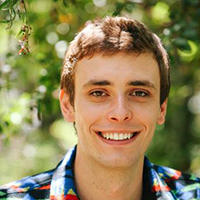
HUCE welcomes new cohort of postdoctoral researchers
Introducing the 2019-2021 Environmental Fellows
The Harvard University Center for the Environment extends a warm welcome to the newest class of Environmental Fellows: Alyssa Battistoni, Marissa Elizabeth Grunes, Paul Ohno, Jon Proctor, and Adam Slavney. These fellows will join a group of remarkable scholars who will be beginning the second year of their fellowships. Together, the Environmental Fellows at Harvard will form a community of researchers with diverse backgrounds united by intellectual curiosity, top-quality scholarship, and a drive to understand some of the most important environmental challenges facing society.

ALYSSA BATTISTONI
Department: Government
Faculty Advisor: Katrina Forrester
PhD: Political Science, Yale University
Alyssa Battistoni is a political theorist working at the intersection between environmental politics, political economy, and feminist thought.
Alyssa earned a BA in Political Science from Stanford University, a MSc in Nature, Society, and Environmental Policy from the University of Oxford, and a PhD in Political Science from Yale University, where she studied political theory. Her dissertation examined the history of the economic approach to environmental problems in the twentieth century and its implications for politics. Her academic work has been published in Political Theory and Contemporary Political Theory, and her writing has appeared in The Guardian, n+1,The Nation, Dissent, The Chronicle of Higher Education, and Jacobin, where she is a member of the editorial board. She is an associate faculty member at the Brooklyn Institute for Social Research.
As an Environmental Fellow, Alyssa will work with Professor Katrina Forrester of the Department of Government to theorize new approaches to the challenges of climate politics, with particular attention to the role of the state and interaction between state and economy.

MARISSA ELIZABETH GRUNES
Department: English
Faculty Advisor: James Engell
PhD: English, Harvard University
Marissa Grunes is a scholar of American literature whose dissertation examines the intersection of architecture and environmentalism in nineteenth-century American culture. She will earn her PhD from the English Department at Harvard University in the Spring of 2019. Marissa's doctoral work brought together architectural history, aesthetic theory, and environmental history to consider the productive relation between the arts and early environmental thought in the nineteenth-century United States. Marissa's interdisciplinary research has also led her into the medical humanities and the history of science, with work on the emergence of the hospice movement and the cultural history of the Antarctic.
As an Environmental Fellow, Marissa will work under the guidance of Professor James Engell in the English Department on a book about Antarctica for the general reader. Incognita: A Portrait of Antarctica will combine historical research with a synthesis of current ecological, atmospheric, and geophysical findings to offer a journey across the continent. Marissa's goal is to produce a rigorously-researched book that will capture the imagination of curious readers, drawing them into the threatened world of the Antarctic and its power to transform our planet.
 PAUL OHNO
PAUL OHNO
Dept/School: Earth and Planetary Sciences & John A. Paulson School of Engineering and Applied Sciences
Faculty Advisor: Scot Martin
PhD: Chemistry, Northwestern University
Paul Ohno is a physical chemist studying the physical and chemical properties of secondary organic aerosol particles and the implications of these properties for the climate system.
Paul earned his AB in Chemistry from Princeton University in 2014 and his PhD in Chemistry from Northwestern University in 2019. During his PhD studies, he used laser spectroscopy to measure fundamental properties of aqueous interfaces so as to better understand, predict, and control chemical processes that occur there, like groundwater pollutant capture at the mineral/water interface.
As an Environmental Fellow, Paul will work with Professor Scot Martin of the John A. Paulson School of Engineering and Applied Sciences and the Department of Earth and Planetary Sciences. Their work will focus on developing and applying spectroscopic techniques to directly determine physical and chemical properties, such as viscosity and diffusivity, of secondary organic aerosol particles while they remain in suspension. Paul is also a 2019 Schmidt Science Fellow.
 JON PROCTOR
JON PROCTOR
Dept/School: Earth and Planetary Sciences & John A. Paulson School of Engineering and Applied Sciences
Faculty Advisor(s): Peter Huybers, Jim Stock, and others
PhD: Agricultural and Resource Economics, University of California, Berkeley
Jon Proctor develops and pairs methods in econometrics, spatial statistics and machine learning with global socio-environmental datasets to empirically estimate the relationships that govern our climate and agricultural systems. For example, in recent work Jon uses volcanic eruptions as natural experiments to provide the first empirically-based estimates of how solar geoengineering might impact agricultural yields. In a second strand of research he develops, characterizes and democratizes new algorithms for planetary-scale monitoring using satellite imagery. Jon graduated from Stanford University in 2014 where he studied Earth Systems; he will earn his PhD in Agricultural and Resource Economics from the University of California, Berkeley in August, 2019.
As a joint Data Science and Environmental Fellow, Jon will continue to explore 1) how human activity alters the transfer of sunlight through the atmosphere, and in turn, how these changes in radiation impact crop productivity and 2) how remote sensing measurements can be efficiently made and appropriately applied to quantify relationships in socio-environmental systems. He is excited to pursue these questions with Peter Huybers, Jim Stock, and others. When he's not at his desk, you can find Jon backpacking, rock climbing, or teaching and performing improvisational theater.
 ADAM SLAVNEY
ADAM SLAVNEY
Department: Chemistry and Chemical Biology
Faculty Advisor: Jarad Mason
PhD: Chemistry, Standford University
Adam Slavney is a chemist and materials scientist who makes and studies porous materials for the capture, storage, and chemical transformation of environmentally important gases.
Adam earned his PhD in chemistry from Stanford University in 2019. His doctoral work focused on the development of halide double perovskites as optoelectronic materials, particularly in the realm of photovoltaics. Adam discovered several new double perovskite phases, extensively studied their promising optical absorption, carrier transport, and defect properties, and outlined simple rules to accurately predict and describe the electronic structures of all halide double perovskites. While at Stanford he held a Stanford Graduate Fellowship and the Franklin Veatch Memorial Fellowship. Prior to Stanford, Adam received his BA in chemistry in 2014 from Washington University in St. Louis.
As an Environmental Fellow, Adam will work with Jarad Mason from the Department of Chemistry and Chemical Biology. His research will focus on the synthesis of novel porous materials such as nanocrystal frameworks and intrinsically-porous liquids. These materials will be used to separate and store technologically important gases such as hydrogen and oxygen as well as to capture and remediate environmental pollutants such as carbon monoxide and the nitrogen oxides. Adam's work will be supported by the Arnold O. Beckman Postdoctoral Fellowship in the Chemical Sciences.